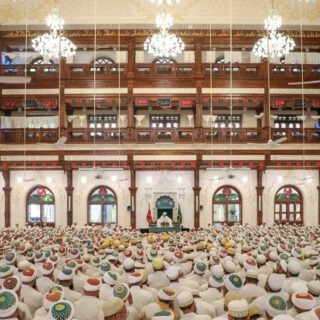The Ikhwan us Safa is one of the first encyclopedias of the sciences. It was composed in the second half of 900 CE by Sahib ur Rasail, Imam Ahmed ul MastoorSA, the 9th Imam. It is divided into 52 epistles that range from arithmetic to astrology, from music to magic, and from love to logic; the 53rd Risalat is known as the Jamea tul Jamea. The Rasail appear in four categories: Mathematical Sciences, the Natural Sciences, the Psychological and Rational Sciences and Theological Sciences.
The authorship of the Rasail remains a mystery to most scholars, this is due to the secrecy and stealth by which they appeared across Basra for the very first time. The Abbasid Khalifa, Mamun, had called a conference in the morning with the intention of undermining Islam. That very night Imam Ahmad ul MastoorSA ordered that the Rasail, which establish the intrinsic connection between philosophy and religion- be placed in all the masjids across the country.
The central philosophy of the Rasail can be summarized in the following quotation: “…to shun no science, scorn any book, or to cling fanatically to no single creed. For [their] own creed encompasses all the others and comprehends all the sciences generally. This creed is the consideration of all existing things, both sensible and intelligible, from beginning to end, whether hidden or overt, manifest or obscure . . . in so far as they all derive from a single principle, a single cause, a single world, and a single Soul.”
In the introduction, the author of the Rasail is likened to a gardener, who owns acres of fertile land blooming with fruit trees and flowers of all kinds. The gardener is generous and wishes to share his bounties with his fellow beings. He beckons to them to come inside, however the people are skeptical and do not come to his garden. Thus the gardener decides to offer a selection of fruits and flowers at the door itself. The fragrance of the flowers and the deliciousness of the fruits they taste draw them in. They are now impatient to enter, at which point the gardener throws open the gates and gives them free access to the garden.








